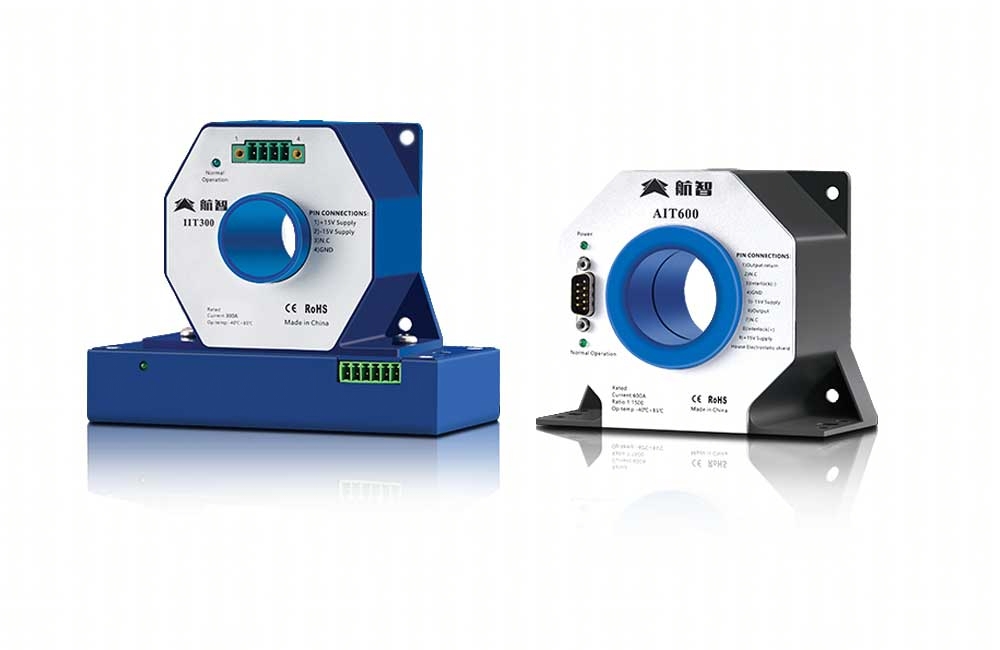How to Select Current Sensors for Industrial and Laboratory

電流センサーは、産業環境と実験室環境の両方で重要な役割を果たし、電流を測定することで電気システムの安全で正確かつ効率的な動作を保証します。電流検出の基本原理は同じですが、使用されるセンサーの種類は環境や特定の要件によって大きく異なる場合があります。この記事では、産業用と実験室用の電流センサーの違いを探り、産業用途に適したセンサーを選択するためのガイダンスを提供します。
産業用電流センサーとは何ですか?
産業用電流センサーは、産業環境におけるさまざまな物理パラメータを監視、測定、制御するために特別に設計されたデバイスです。これらのセンサーは、製造、再生可能エネルギー生産、自動車自動化システム、プロセス制御などの産業において重要です。産業用電流センサーの主な用途には、モーター制御、電力管理、過負荷保護、エネルギー監視が含まれます。
産業用電流センサーの目的は、工業生産または特定の環境内でリアルタイムデータを提供することです。このデータは、自動化システムの作動、アラームの生成、またはさらなる分析のためのデータ記録を可能にするためによく使用されます。これらのセンサーは、異常の検出、プロセスの最適化、システムの円滑な動作を確保するのに役立ちます。
産業用電流センサーはどのように機能しますか?
産業用センサーは通常、電磁誘導またはホール効果の原理に基づいて動作します。電流が導体を流れると、対応する磁場が生成されます。センサーはこの磁場の変化を検出することで電流を測定します。産業用電流センサーは通常、より高い電流を測定し、フィードバック機構を備えた閉ループ設計を採用することで、正確で安定した測定を保証します。また、強い耐干渉性を備えており、過酷な環境下でも信頼性の高い性能を発揮します。
研究室用電流センサーとは何ですか?
実験室用電流センサーは、一般的に研究実験室、教育機関、製品開発、または精密測定環境で使用されます。その目的は、低電流または高電流を正確に測定することで、高いテスト精度が必要です。実験室用電流センサーは高い精度を提供しなければなりません。
産業用センサーと比較して、これらのセンサーは一般的に小型で精度が高いです。実験や科学研究において、マイクロアンペアからアンペアまでの電流を測定するためによく使用されます。実験室用電流センサーはまた、より高い分解能、より低いノイズ干渉、およびより高い感度を提供し、詳細で正確な測定を保証します。
研究室用電流センサーはどのように機能しますか?
実験室用電流センサーは、産業用センサーと同様の原理で動作しますが、精度と感度を向上させるためにより高度な技術を採用していることがよくあります。例えば、一部の実験室用センサーは、ゼロフラックス技術や超伝導量子干渉デバイスを利用して、非常に高い電流分解能を実現することができます。さらに、実験室用センサーは通常、より広い周波数範囲と低いノイズレベルを特徴としており、科学研究における厳密なデータ精度要件を満たします。
産業用と実験室用電流センサーの主な違い
産業用および実験室用の電流センサーはどちらも電流を測定しますが、設計、性能、および適用シナリオにおいて大きく異なります。これらの違いは主に以下の領域に現れます:
精度、測定範囲と性能
産業用電流センサー
産業用電流センサーはより高い精度を必要としますが、実験室用電流センサーほど正確ではありません。産業用センサーは通常、0.5%から2%程度の中程度の精度を必要とします。産業用電流センサーは、広い測定範囲(例:kAレベルの電流)または動的負荷変化をサポートします。
産業用電流センサーは、長期安定性と信頼性を優先し、精度と実用性のバランスを取ります。
実験室用電流センサー
実験室用電流センサーは、ppmレベルまでさらに高い精度を必要とします。これらのセンサーは高精度と高分解能を提供し、小さな電流変化も検出できます。研究、教育、実験室、校正施設に適しています。
一部の実験室用電流センサーは、高い精度を達成するために狭い範囲設計を採用し、範囲を犠牲にして高精度を実現します。
関数とインターフェース
産業用電流センサーは通常、PLCとの統合を容易にするために4-20mAや0-10Vなどの標準化された出力を備えています。また、過負荷アラームや自己診断機能などの故障診断を提供し、遠隔監視をサポートします。
実験室用電流センサーは、PCやオシロスコープに接続するためのRS232やRS485などの柔軟なインターフェースを提供し、必要に応じてカスタマイズできます。
実験室用電流センサーは、波形解析、高調波測定、データ分析など、さまざまな機能を提供します。機能は必要に応じて変更することもできます。
サイズと外観
絶縁と環境保護の必要性により、産業用電流センサーは通常、サイズが大きくなります。また、産業用制御システムとの統合のためにモジュール設計を採用することもできます。
実験室用の電流センサーはよりコンパクトで携帯性に優れ、より小さな作業スペースでの使用に適しています。通常、軽量で、実験装置やテストベンチにあまり場所を取らずに組み込むことができます。
環境適応性
産業用センサーは、電磁ノイズ、振動、極端な温度、化学物質やほこりへの曝露などの過酷な産業環境に耐えるように設計されており、強い干渉耐性を示します。通常、IP65/IP67保護を備えており、高い防塵性、防水性、耐腐食性を確保します。頑丈な筐体は衝撃や振動に強く、過酷な環境でも耐久性を保証します。また、高い機械的強度も提供します。
実験室用センサーは非常に厳しい環境要件があります。通常、温度と湿度が制御された環境で動作し、極端な条件への曝露を最小限に抑えます。精度と使いやすさが堅牢性よりも優先されます。したがって、実験室用電流センサーの保護等級は低くなります。そのため、実験室用センサーがほこりや湿気に直接さらされることを最小限に抑えることをお勧めします。
信頼性と寿命
産業用電流センサーは長寿命運転を目的として設計されており、24時間365日の連続運転をサポートし、平均故障間隔(MTBF)は数万時間に及びます。重要な用途によっては、冗長電源または信号出力をサポートします。
実験室用電流センサーは、連続的な高負荷運転を必要とせず、精度を優先するため、産業用電流センサーよりも寿命が短くなります。
認証とコンプライアンス
産業用および実験室用の電流センサーには関連する認証が必要ですが、産業用電流センサーはより高い要件があり、産業安全基準に準拠しなければなりません。
コストとメンテナンス
産業用電流センサーは、必要な絶縁、保護設計、および産業用制御システムとの統合により、より高価になる傾向があります。ただし、メンテナンスサイクルが長く、モジュラー交換をサポートすることが多いため、コストを分散させます。
実験室用電流センサーは比較的安価ですが、専門的なセンサーはより高価です。実験室用電流センサーは大規模な産業用途ではほとんど使用されず、大量生産できないため、価格が高くなります。しかし、メンテナンスコストは低いです。
産業用アプリケーションに適した電流センサーの選び方
適切な電流センサーを選ぶには、測定要件、環境条件、システム互換性、コストを総合的に考慮する必要があります。これらの要素には以下が含まれます:
- 正確性と信頼性
正確な電流測定が重要な場合は、高精度で測定誤差の少ないセンサーを選んでください。一般的な産業用途では、性能と信頼性のバランスをとるセンサーを検討してください。 - インストール環境
現在のセンサーが屋内または屋外に設置されるか、防水が必要か、そして温度、湿度、振動、腐食性物質などの要素を考慮してください。環境に適した頑丈なセンサーを選んでください。 - 制御システム統合
センサーが既存の制御システムまたは自動化プラットフォームと統合できることを確認してください。多くの産業用センサーは、PLCシステムや他の産業用制御システムで動作するように設計されています。 - コスト考慮事項
高精度の実験室用電流センサーは高価になる場合がありますが、産業用センサーは大規模な操作に対してよりコスト効果が高いです。予算と運用ニーズに基づいて選択し、測定精度が要件を満たしていることを確認してください。
結論
要約すると、産業用と実験室用の電流センサーの違いを理解することで、特定のアプリケーションのニーズに基づいて情報に基づいた決定を下すことができます。産業用センサーは頑丈で信頼性が高く、大規模システムの要求を満たすように設計されていますが、実験室用センサーは科学研究に必要な精度と正確性に焦点を当てています。電力産業で使用されるような一部の高級産業用センサーは両方の特性を備えていますが、コストは高くなります。
Hangzhi について
Shenzhen Hangzhi Precision Electronics Co., Ltd. は、高精度電流センサ、電圧センサ、高精度電気測定器の研究開発、生産、販売、ソリューションカスタマイズに特化した技術をリードする企業です。私たちは、以下の有名なブランドを構築するために努力しています。 . 直流分野における精密電流センサーと精密電気測定器を製造し、直流システム分野における精密エレクトロニクスの国際的リーダーとして発展することを目指す。
